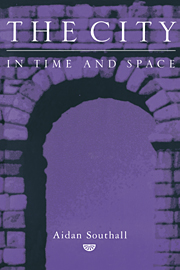Book contents
- Frontmatter
- Contents
- List of illustrations
- Acknowledgements
- Introduction
- 1 ‘Writing the city under crisis’
- 2 Pristine cities
- 3 Greece and Rome
- 4 Cities of the Feudal mode of production in Europe
- 5 Asian cities: Asiatic and Feudal modes of production
- 6 From colonial to Third World cities
- 7 The transformation of the city: from the Feudal to the Capitalist mode of production and on to the apocalypse
- Notes
- References
- Index
1 - ‘Writing the city under crisis’
Published online by Cambridge University Press: 10 December 2009
- Frontmatter
- Contents
- List of illustrations
- Acknowledgements
- Introduction
- 1 ‘Writing the city under crisis’
- 2 Pristine cities
- 3 Greece and Rome
- 4 Cities of the Feudal mode of production in Europe
- 5 Asian cities: Asiatic and Feudal modes of production
- 6 From colonial to Third World cities
- 7 The transformation of the city: from the Feudal to the Capitalist mode of production and on to the apocalypse
- Notes
- References
- Index
Summary
Chapter 1 recognizes the deepening urban crisis, rehearsed almost daily in press and media. It images the urban vista of the last ten millennia, the concentration of the best and worst in human potentiality. Major intellectual approaches and the dilemmas of anthropology in studying the city are discussed. The grand theme of the city is introduced and the theory of successive, dialectically related modes of production is spelled out as the chosen framework of presentation.
Prologue
To write about the city in the mid-nineties is to write under pressure of ‘deepening crisis’ (in our present day economies and societies) (Braudel, 1985, III:625). For anthropology, to which nothing human is alien, the city encapsulated human achievement and destiny. If the motive of history is to explain the present and the obligation of anthropology to empathize reflexively with the other, the last frontier of time and culture is daring to ask what we have learnt in the city to save our grandchildren from ultimate destruction. The city concentrates the human experience and has taught some lessons although the future is not to be foretold. Braudel read clearly but broke off at the intractability of the social problem. We cannot hope that dominant groups will agree to hand over (Braudel, 1985, III:632). Marx dared to envisage a new human being, without whom his revolution could never succeed. If there is any new element in the situation it is the gravity of the crisis.
In his fascinating Afterthoughts on Material Civilization and Capitalism (1977) Braudel unwittingly summed up the anthropologists' view of the people in the city through the ages.
- Type
- Chapter
- Information
- The City in Time and Space , pp. 3 - 22Publisher: Cambridge University PressPrint publication year: 1998



